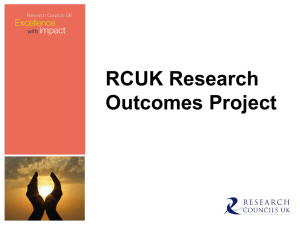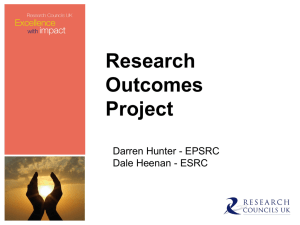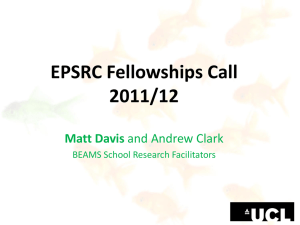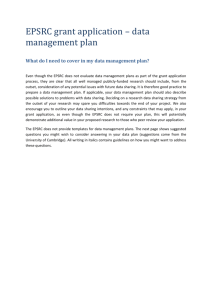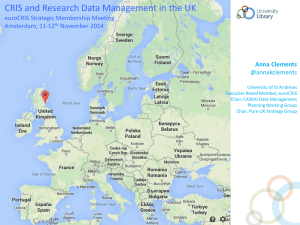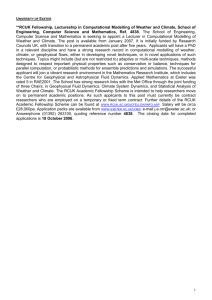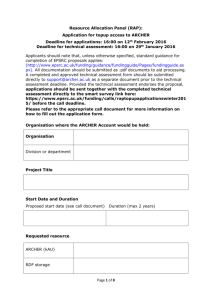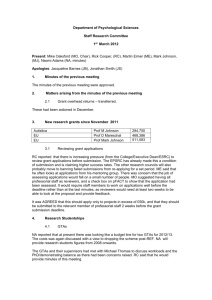Digital Economy - John Baird - College of Engineering, Mathematics
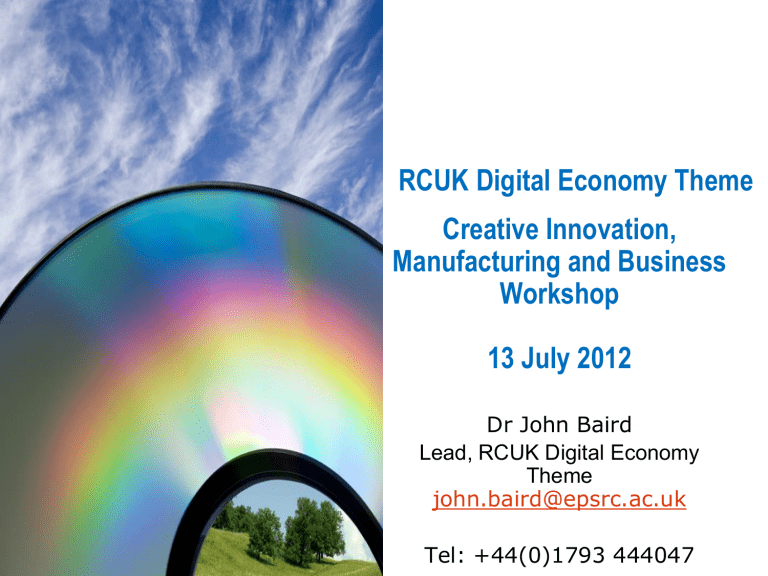
RCUK Digital Economy Theme
Creative Innovation,
Manufacturing and Business
Workshop
13 July 2012
Dr John Baird
Lead, RCUK Digital Economy
Theme john.baird@epsrc.ac.uk
Tel: +44(0)1793 444047
Summary
Overview of the RCUK Digital Economy theme
What is it?
How it is structured
Press coverage and examples from the DE Theme’s major investments etc
Impact Review
Why did RCUK make the case for Digital Economy Theme?
Huge challenges driven by massive changes in digital technology & internet. Opportunities afforded by increasingly connected world, not just high speed broadband internet access, but also mobile comms through smart phones, tablets, and other portable devices
• 90% of all data created in past two years
• Across G-20 Internet economy = 4.1% GDP,
$2.3 trillion in 2010
• Business driven by the internet comprises 8.3% of the British economy £121 billion
• 1 trillion devices connected to the Internet by
2015, 3bn users, internet economy $4.2 trillion in G-20
Opportunities to address real need (societal challenge) & radically change the ways companies interact with customers and run their supply chains.
The DE Theme Vision & Approach
:
“Technology alone is not enough ”
“ It’s technology married with liberal arts, married with humanities, that yields the results that make our hearts sing ”
Steve Jobs introducing the iPad2
Could have been describing the
Digital Economy Theme.
DE Vision : Rapidly realise the transformational impact of digital technologies on aspects of community life, cultural experiences, future society, and the economy
.
The DE Theme Overview - 1
Partners : EPSRC (£106M), AHRC (£12M) and ESRC
(£11M). MRC in previous CSR
113 core projects >£150M since 2008. Plus 174 non core allied projects (33 ESRC, 28 AHRC, 113 EPSRC)
= Total £213M. 400 User Partners
People/user focused . Develop technology by understanding how people use it. Asks how would people or organisations exploit/use ubiquitous digital technology? Co-creation is mandatory
Collaborators (some from CDTs)
The DE Theme Overview - 2
Cutting edge research is in the cross disciplinary nature of the DE Theme. Brings together diverse areas (ICT, Engineering,
Social Sciences, Economics etc) working together to solve a DE relevant Challenge
Since 2007/8 FY, evolved 4 thematic targeted and specific
Challenge Areas
DE sub-themes and taxonomy
Popular Press coverage -1
Tales of Things Electronic Memories (ToTem) from Design in the
Digital World Sandpit
Popular Press coverage - 2
Digital Sensoria “Online clothes shopping gets the human touch “ in New Scientist;
Building on Ambient Kitchen research “The talking kitchen that teaches you French “ -
Voice of America, etc
Adaptive ride based on physiological data, New Scientist (Horizon Hub) http://www.youtube.com/watch?v=P5YuXrDez
40&feature=player_embedded
Funding for DE had a steep trajectory
– big investment in grants
Skills and Capacity - main investments
3 Digital Economy Hubs – include many disciplines
£12M each inc £2M partnership funding + gearing
1. Horizon, Nottingham
2. Social Inclusion through the Digital Economy,
Newcastle and Dundee
3. dot.rural, Aberdeen
7 Centres for Doctoral Training
(Each £5M >100 students p.a. - geared funding)
Digital Entertainment, Bath & Bournemouth
Healthcare Innovation, Oxford
High Wire (Creating Innovative People for
Radical Change), Lancaster
Horizon (Ubiquitous Technologies), Nottingham
Media and Arts Technology, QMUL
Financial Computing, UCL, LSE & LBS
Web Science, Southampton
Main investments 2
– Digital City Exchange £5.9m Imperial College .
Focus on using digital technology to boost the capabilities of integrating transport, health, social and other systems in our cities, so that they can run as effectively as possible
– Framework for Research & Innovation in MediaCityUK (FIRM, with
AHRC) £2.7M. A 7 partner, multidisciplinary consortium providing the mechanism that connects the BBC and the Digital & Creative Industries sector to research and innovation at Salford Quays. Salford lead. Building in MediaCity
Main investments - 3
Research in the Wild
30 projects, £6M
Sandpits in Designing Effective Research Spaces (3 projects £3.2M with AHRC) and Design in the Digital World (8 projects inc Tales of
Things Electronic Memories (ToTem) £5.7M)
4 Network+ (£6M total) Opportunities to get Involved
9 TEDDI (£3.9M) & 9 BuildTEDDI (£4M) (joint with Energy Theme)
Creativity Greenhouse - Virtual Ideas Factory
Copyright and New Business Models in the Creative Economy – with
AHRC (lead) and ESRC (£4.6M total)
DE Theme Impact Review -
E vidence of success
Led by Andrew Herbert + 11 others
(7 users and 2 international members)
• DE Theme well positioned for success
• Strong multidisciplinary - potential for significant and new forms of impact. Filling gap vacated by strategic industry research; creating new research ecologies between disciplines, institutions, user communities
• Demonstrates good science building on evaluating and extending quality basic research.
• Engagement with wide spectrum of users including general public and reaching new audience.
• Users say DE is a challenge area of increasing scope over coming decade; a long term investment - has the potential to increase UK competitiveness and attract inward investment. DE funded work attracts further investments from TSB, EU, industry.
Thank You
Treasury
HEFCE
BIS
Adrian
Smith
RCUK
TSB
AHRC
£99M
BBSRC
£358M
ESRC
£154M
EPSRC
£751M
MRC
£554M
NERC
£296M
STFC
£377M
Research Councils in the Exploitation Path – invest taxpayers’ money to support high quality research and training (mainly in Universities)
User requirements/market opportunities
Discover Understand Adapt/Integrate Validate
Research Councils: AHRC,
EPSRC, ESRC, MRC etc
TSB, ETI and other partners
Government and business
Universities
Deploy
Commercialisation
Initiation Exploitation
